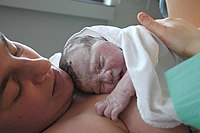
Photo from wikipedia
Any bacterial infection of the genital tract after childbirth is called maternal puerperal infection. This infection accounts for 13% of pregnancy-related deaths and is the fifth leading cause of maternal… Click to show full abstract
Any bacterial infection of the genital tract after childbirth is called maternal puerperal infection. This infection accounts for 13% of pregnancy-related deaths and is the fifth leading cause of maternal mortality. Endometritis (postpartum uterine infection) has been associated with preeclampsia and maternal lethal bleeding in recent decades. In some studies, the presence of meconium in the amniotic fluid has been implicated in the development of endometritis. The study aimed to evaluate the association between interleukin-19 gene polymorphisms and maternal puerperal infection. In this study, 300 pregnant women with a gestational age of at least 37 weeks were studied. Patients were divided into two groups of 150 controls and cases. In the case group, amniotic fluid was impregnated with meconium, and in the control group, it was clear fluid. Both groups underwent cesarean section, and all received prophylactic antibiotics before surgery. Patients were evaluated for purpura infection in the first 40 days after delivery. Five ml of venous blood was taken from each patient and transferred to a tube containing EDTA anticoagulant. Genomic DNA was isolated using a particular kit. Then, the polymerase chain reaction was performed by the ARMS method. Data were analyzed using the chi-square test and SPSS software version 19 in case and control groups. This study's results indicate no significant difference in the frequency of AG, GG, and AA genotypes at position rs2243191 and rs1028181 IL-19 gene polymorphism between patients with puerperal infection and the control group (P>0.05). Also, no significant difference was observed in the frequency of both G and A alleles in the mentioned situations between patients and the control group (P>0.05). Based on the results of this study, no significant relationship was observed between IL-19 gene polymorphism at rs2243191 and rs1028181 locus and puerperal infection.
Journal Title: Cellular and molecular biology
Year Published: 2022
Link to full text (if available)
Share on Social Media: Sign Up to like & get
recommendations!